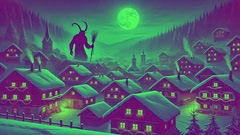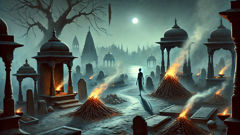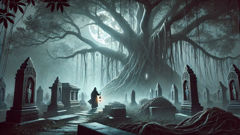Introduction
Winter in the Austrian Alps arrives not with a gentle hush, but with a deepening of shadows and a hush that presses against windows and hearts. In the valley village of Grünwald, the snow falls in thick, heavy veils, blanketing rooftops and pinning the world into a slow, blue silence. At dusk, golden light seeps from between shutters, flickering as candles are lit to chase away the growing dark. The mountains loom close, their forests thick with spruce and secrets, their peaks forever lost in the silver mist. Here, stories are as much a part of survival as bread and firewood. None is whispered more urgently than the legend of the Krampus—a horned, shaggy beast with cloven hooves and a tongue like an ember, who descends with Saint Nicholas each December. Children in Grünwald grow up measuring their deeds against the year’s end, their hopes pinned on sweets and oranges, their fears conjured by the rattle of rusty chains in the night. For every child who dreams of Saint Nicholas’ kindly smile, there’s another who imagines the Krampus, half-man, half-beast, stalking the woods. Yet legends have their roots in truth, and sometimes, the boundary between fable and reality is as thin as a pane of frost on the village windows. In this alpine world, one young girl named Leni will soon discover just how real the old stories can become.
The Eve of Saint Nicholas
The day before Saint Nicholas’ arrival in Grünwald was always the most restless. From dawn, the village pulsed with nervous energy: mothers swept doorsteps with extra care, fathers stacked firewood and repaired shutters, and children whispered in corners, their eyes darting to the dark line of the forest. It was Leni’s favorite time—she loved the sharp scent of pine needles underfoot, the crispness of the air that turned every exhale to white mist. This year, she was eleven, old enough to help her mother braid honeyed bread and polish apples for the feast.
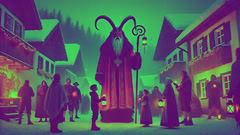
But there was a tension beneath the preparations. Leni’s younger brother, Josef, only seven, had become wild in the weeks before winter: chasing chickens, stealing pastries, and earning sharp words from every corner. Leni scolded him, but Josef shrugged off warnings with a bravado that looked thin in the cold. "He’ll learn," their mother sighed, but her voice trembled. At dusk, Leni and Josef carried baskets of sweets to the old chapel, where villagers left offerings to Saint Nicholas—a bribe, some said, to keep Krampus at bay. Candles flickered against the stone walls, shadows leaping and shrinking as the door opened and closed.
Outside, the wind picked up, carrying with it a strange, metallic sound. Josef clutched Leni’s sleeve, his bravado gone. "Did you hear that?" he whispered. Leni listened. The sound came again: a distant rattle, like chains dragging over rock. She forced a smile. "Just the goats," she said, but her words faded into the wind.
That night, sleep would not come easily. The fire in their cottage burned low as Leni lay awake, the familiar shapes of furniture rendered strange by moonlight. Somewhere outside, a dog barked, then whined and fell silent. Leni’s mother moved quietly, tucking blankets around her children and muttering old prayers. "Remember," she whispered, her breath warm on Leni’s forehead, "be kind and honest, for Saint Nicholas sees all. The Krampus comes for those who stray." Leni nodded, but her thoughts tangled—was Josef truly wicked, or simply young?
Near midnight, thunderous pounding echoed down the lane. Leni sat bolt upright, heart pounding. The sound was not thunder, nor hoofbeats—it was something heavier, more deliberate. She crept to the window and peeked through the frost. The moon hung low, shrouded by clouds, yet movement caught her eye: a shadow slipped between houses, impossibly tall and hunched, trailing what looked like chains. She blinked hard. When she looked again, nothing moved except the blowing snow.
Morning arrived pale and cold. Villagers gathered on the green, faces pinched with worry. Old Frau Moser’s chickens were gone—"A fox," muttered her husband, but no tracks marred the perfect snow. The baker’s daughter swore she’d seen a horned figure watching from the woods. Josef was unusually quiet, eyes wide. Leni squeezed his hand. "It’s just stories," she said, but her voice betrayed her.
The day passed in a whirl of chores. By dusk, the anticipation in Grünwald was thick enough to taste. The church bells rang out, and families dressed in their finest furs and wool. Lanterns bobbed along the lane as Saint Nicholas, tall and stately in his red robe and gold-trimmed mitre, approached the village square. His beard was white as snow, his eyes kind but knowing. Behind him, cloaked in darkness and menace, came the Krampus: monstrous, towering, his fur matted with snow, horns gleaming, and a basket slung over his back.
Children lined up, trembling. Saint Nicholas called each by name, recounting their good deeds with a twinkle in his eye. Josef clung to Leni, cheeks pale. When his turn came, Saint Nicholas’ gaze was gentle but firm. "You’ve tested your mother’s patience, Josef," he said. "Remember, kindness is the path to warmth in winter." Krampus loomed, rattling his chains, but did not move. Josef stammered an apology and was handed a single orange—no sweets this year.
The ceremony ended with laughter and relief. Parents herded children home, and lanterns flickered out one by one. Leni tucked Josef into bed, humming old lullabies. She pressed her ear to the night, half-expecting the chains to rattle once more. But all was still, except for the snow, falling in relentless silence.
Chains in the Night
The storm arrived before dawn—a wall of wind and snow that battered Grünwald for three days. The world shrank to the firelit interior of Leni’s cottage, the outside transformed into a swirling void. Josef grew restless, pacing and complaining, while Leni tried to distract him with stories and games. Their mother’s hands trembled as she mended old mittens, glancing often at the window. When the storm finally broke, the village emerged blinking into a landscape transformed. Snowdrifts towered over fences. The woods wore a frozen hush. The relief was short-lived: as families began to check on neighbors and livestock, cries went up—Josef was nowhere to be found.
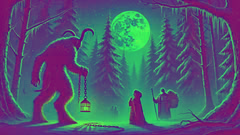
Panic swept through Grünwald. Leni’s mother wept, clutching Josef’s empty bed. Villagers searched barns and byres, called through the woods, and followed every trail. Leni felt hollow, her guilt as sharp as the winter air. If only she’d kept a closer watch, if only she’d been kinder. The fear that gripped her was not just for Josef, but for what might have taken him. At the edge of the woods, she found strange tracks: too large for a wolf, too deep for a deer. Broken twigs and a dusting of black hair littered the snow.
Whispers of the Krampus grew fevered. Old men shook their heads and told darker stories than before—of children spirited away for their wickedness, of caves deep in the mountains where the Krampus kept his prisoners until spring. Leni refused to believe it. Josef was mischievous, not evil. She gathered her courage and resolved to search for him herself.
Before dawn, Leni wrapped herself in layers of wool and fur, stole bread from the kitchen, and slipped out into the pale light. Her footprints were swallowed quickly by new snow as she crossed the fields and entered the woods. The silence was heavy, broken only by her breath and the creak of snow-laden branches. She moved carefully, recalling every story she’d ever heard: that Krampus hated fire, that he could be tricked by cleverness, that he was bound by rules as old as the mountains.
Hours passed. Leni followed scraps of cloth snagged on thorns, and once, a bright orange peel half-buried in snow—Josef’s orange from Saint Nicholas. Hope surged in her chest. But as daylight faded, the forest changed. Shadows lengthened; shapes twisted into monstrous forms. Then she heard it: the rattle of chains, slow and measured, echoing between the trees.
Leni’s heart hammered as she pressed herself against a fir trunk. The air tasted of iron and smoke. The chains grew louder until a shape emerged—impossibly tall, covered in black fur, eyes glowing like coals. The Krampus stood before her, a vision from every nightmare. In one clawed hand he held a birch rod, in the other a heavy basket. From within, a child’s muffled cry reached Leni’s ears—Josef.
The beast’s gaze fixed on Leni. She trembled but did not run. Remembering her grandmother’s tales, she fumbled in her pouch for the crust of bread and held it out. "Please," she whispered, "take this for me, instead." The Krampus’ nostrils flared. His tongue flickered, tasting the air. Leni’s courage held. "He’s just a boy," she pleaded. "Let him go."
For a long moment, nothing happened. Then, in a voice like gravel shifting under ice, the Krampus spoke. "Why do you plead for one who’s strayed? Would you take his place?"
Leni swallowed. Her legs shook, but she nodded. "Yes."
The Krampus’ eyes narrowed. He bent low, chains jangling. "You love him enough to face the dark?"
"Yes."
There was a sound behind her—soft footsteps in the snow. Saint Nicholas appeared, his staff glowing faintly in the dusk. He looked at Leni, then at the Krampus. "Mercy tempers justice," he said quietly. "You have shown true kindness."
The Krampus hissed, but his grip loosened on the basket. With a sharp gesture, he set Josef on the ground. The boy stumbled to Leni’s side, sobbing. Saint Nicholas knelt, touching both children’s shoulders. "Remember this night," he said. "Goodness is not the absence of mistakes, but the courage to do right when it matters."
The Krampus retreated into shadow, his chains rattling less fiercely. Saint Nicholas smiled. "Come, let us return home. The snow is not so cold when hearts are warm."
Leni led Josef back through the woods. The moon rose, bright and full, casting silver over the snow. Behind them, the old stories breathed anew—now tempered with hope.
Conclusion
The legend of the Krampus endures in Grünwald and across the Alpine valleys—not only as a warning to mischievous children, but as a reminder of balance. As winter deepened and Saint Nicholas’ visit faded into memory, Leni and Josef found themselves changed. Josef’s wildness softened; he grew more thoughtful, his laughter still bright but edged with gratitude. Leni’s courage became the quiet strength of the household, her story retold by firesides for generations. The villagers came to see the Krampus not merely as a monster, but as a keeper of ancient law—a force that demanded respect for tradition and compassion in equal measure. And so, when snow falls thick and chains rattle faintly in the woods, the people of Grünwald remember: goodness is forged in adversity, and mercy is the true magic that warms even the coldest winter night.

